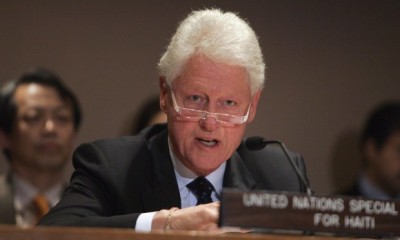Are Clinton’s Bombs Wagging the Dog?

All Global Research articles can be read in 51 languages by activating the Translate Website button below the author’s name.
To receive Global Research’s Daily Newsletter (selected articles), click here.
Click the share button above to email/forward this article to your friends and colleagues. Follow us on Instagram and Twitter and subscribe to our Telegram Channel. Feel free to repost and share widely Global Research articles.
***
This article originally published in 1998 confirms criminality on the part of former President Clinton who ordered the bombing of Afghanistan and Sudan as a means to divert attention from the Monica Lewinsky affair and the impeachment procedures directed against him. No indictment, no followup? What would be the legal implications of this “Wag the Dog” criminality on the part of a a former president of the United States.
M. Ch. August 21, 2023
***
Coming three days after the president’s unsatisfying apology to the nation, and on the same day as Monica Lewinsky’s return to the grand jury, the U.S. military strikes Thursday in Afghanistan and Sudan have skeptics asking: Are they truly a response to the Kenya-Tanzania bombings of American embassies, or a manufactured crisis to divert public attention from his personal troubles? Or, as one reporter asked Defense Secretary William Cohen at a news briefing on the attacks, isn’t there a “striking resemblance” to “Wag the Dog”? Cohen, forced to address the issue, said, in essence, of course not.
For the uninitiated, “Wag the Dog” was the recent Barry Levinson film spoof depicting a White House that invented a war to distract the country from a presidential sex scandal. The similarities between the film and Thursday’s events are just too eerie to ignore.
OK, let’s say no thought was given to the president’s personal and political woes in making the strike. But why, Cokie Roberts of ABC News asked in a live television broadcast, did the president feel the need to rush back to Washington to handle the crisis? Couldn’t he have conducted the country’s business in this matter from his vacation retreat?
Most Americans will be outraged at the suggestion that the president would risk American lives to serve his personal political needs. But some, suspicious of past presidents’ actions, won’t be so sure. They will point to the alleged Pearl Harbor conspiracy–the so-called back door to American involvement in World War II. They will invoke memories of what many still believe was Lyndon Johnson’s “phony” Tonkin Gulf incident to allow him to escalate the Vietnam War.
There was of course no Pearl Harbor conspiracy; nor did LBJ invent a North Vietnamese torpedo boat attack to compel the Tonkin Gulf Resolution that Congress passed with only two dissenting votes. Nevertheless, like these two earlier incidents, the doubts and suspicions will grow about the need and urgency for the Afghan-Sudan strikes.
There is a compelling object lesson in these suspicions. First, a wounded president whose credibility has been shattered by his own lies and misdeeds simply is not in a good position to conduct foreign policy. True, as president and commander in chief, Clinton holds the power to order military actions necessary to the national security. But foreign and defense policies in our democracy, especially those posing costs in blood and treasure, demand a national consensus.
Presidents leading us into war have understood that an effective policy abroad depends on a shared commitment to that policy at home. As one American statesman, former Secretary of State George Shultz, once wisely said, “Trust is the coin of the realm.” A president whose trustworthiness is in doubt labors under an impossible burden when trying to lead the nation through a crisis overseas.
The Lewinsky scandal is no longer just about sex or a president who lied to the public about his personal misdeeds. It is now an integral part of national politics, of presidential effectiveness in marshaling support for difficult choices overseas. The questions that will continue to burden this president in the days ahead about perjury, obstructing justice and ultimately impeachment are a blight on his capacity to govern.
As Thursday’s military action makes clear, there are important matters that must be handled in the world, ones that require a president with the support of his people. Kenneth Starr should conclude his investigation as quickly as possible and give Congress and the country the wherewithal–one way or another–to get this scandal behind us. If Starr’s findings lead to impeachment, or to Clinton’s resignation, so be it.
Perhaps it is time to let the country establish a more trusting relationship with a President Gore, who will come with less baggage and thus will be freer, among other things, to conduct a more effective defense policy.
*
Note to readers: Please click the share button above. Follow us on Instagram and Twitter and subscribe to our Telegram Channel. Feel free to repost and share widely Global Research articles.

